English CBSE Class 10 NCERT First Flight Chapter 3 Two Stories about Flying Free Solution of Extra Questions and Answers – Extract Based Questions Short Answer Questions Long Answer Questions and Value Based Questions
TWO STORIES ABOUT FLYING
(Extra Questions)
Extract Based Questions
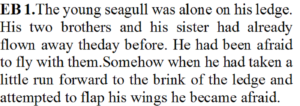

1. Why was the young seagull afraid to fly?
2. Which word in the extract mean ‘tried’?
3. Finally who had motivated the young seagull to fly?
4. What punishment was given to the young seagull by his parents?
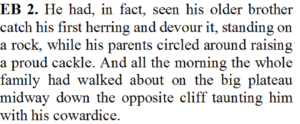

1. Name of a type of fish is mentioned in the extract. Please write that word.
2. Which word in the extract is antonym of ‘bravery’?
3. Who has been referred as ‘he’ in above extract?
4. How many siblings did ‘he’ have?


1. Who is referred as ‘she’ in the above extract?
2. Which word in the extract mean ‘pulled apart’?
3. Please write singular of word ‘feet’.
4. Why was ‘she’ scrapping her beak on the rock?
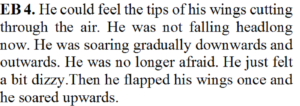

1. Why was ‘he’ not afraid now?
2. Which word in the extract mean ‘flew’?
3. Who was flying nearest to ‘he’?
4. Who all flew around ‘he’ during his first flight?
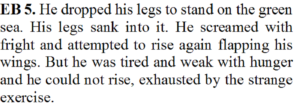

1. What is the meaning of phrase ‘the strange exercise’?
2. Which word in the extract is synonym of ‘fear’?
3. What had happened when his belly touched the sea?
4. Which word in the extract mean ‘tired’?


1. Who is referred as ‘they’ in above extract?
2. Which word in the extract mean ‘walked’?
3. Why ‘they’ did not take notice of ‘him’?
4. What was father of ‘he’ doing at that time?
Short Answer Questions (30-40 words)


Answer: His mother swooped over him, her wings making a loud noise. His father flew over him screaming. His siblings flew around him curveting, banking, soaring and diving. They all were happy that he has started flying.


Answer: He had not eaten anything since last twenty four hours. He had become slightly weak. He was physically tired because of efforts made during flying.
He was afraid of flying. Suddenly he had to fly because he was falling down. So he was emotionally tired as well.


Answer: Initially he was full of terror. His heart stood still and he could hear nothing. Soon he spread his wings and started flying and soaring.
He again had fear while landing on sea. But soon he started floating on it.
He was happy to have made his first flight.


Answer: The young seagull was sure that his wings would not support him. So he was afraid of flying. His parents motivated and even scolded him. But he could not overcome his fear.
So he did not fly with his siblings.


Answer: He slowly came to the edge of the ledge. He stood on one leg and hid another leg in his wings. He closed his eyes and pretended to sleep.
This is how he tried to attract attention of his mother.


Answer: He dived to eat fish held in the beak of his mother. He fell outwards and downwards. He spread his wings and started flying. At the end of his first flight he landed on the green sea.


Answer: The young seagull thought of sea as green flooring. He saw his siblings sitting on it. Thus we infer that he took sea as a piece of land.
He tried to stand on it but his feet sank into it. He got afraid and tried to soar again. He was exhausted so could not rise again. His belly touched water and he started floating on water. Thus his confusion was removed.


Answer: His siblings had shorter wings than that of young seagull. But they had already flown a day before. They were learning to perfect the art of flying from their parents. They had learnt to skim on surface of water and to catch fish.


Answer: Parents had taught siblings of the seagull how to fly, skim on sea water and catch fish. They also made sure that the young seagull learnt these activities. All family members rejoiced when the young seagull made his maiden flight.
Thus Family members of young seagull were co-operative to each other.
Long Answer questions (120-150 words)


Answer: In the beginning the young seagull was a coward. Though his siblings had already flown he did not make any attempt to fly. He was afraid that his wings would not support him. His parents had tried to motivate and even scolded him. They kept him without food. His siblings and parent teased him. But he did not fly. He continued to fully depend on his parent for food.
A day later he had become very hungry. He dived to take food from beak of his mother. He fell outwards and downwards. Now he had to spread his wings which he did. He flapped his wings. He started flying and soaring. Now he was very happy. His whole family was happy. He landed on the sea and started floating on it. He had learnt flying.
Thus from being a coward in the beginning, he had gained confidence later.


Answer: The young seagull was afraid of flying. He thought that his wings would not support him. Though his siblings who had shorter wings had already flown away, he had decided not to fly. His parent had tried to motivate him and even scolded him but he did not budge.
His mother thought of a plan. The young seagull was not given food for a day. Next day mother took a small piece of food in her beak but did not go very close to the young seagull. Because of hunger, he dived to eat food and was forced to fly.
The mother loved the young seagull very much. She knew that it was very important for him to learn to fly. It was because of her love she was determined to teach him flying.
She wanted to teach him to be courageous and to learn essential things in life.


Answer: I strongly believe that parents motivate their children to take first step into the world. Author has illustrated this truth through a story of young seagull.
In the chapter ‘His First Flight’, the young seagull was afraid to fly. His parents were well aware that it was a must for him to fly. The young seagull had a doubt that he will fall down during his first flight. The parents knew that he will not. Finally the parents thought of another method to motivate him to fly and it worked. They young seagull made his first flight without any untoward incident. He was encouraged by his siblings and parents.
Siblings of young seagull had flown away from the ledge two days ago. Parents were perfecting them in the art of flying, skimming and diving. They continued their help and guidance to their kids.
Thus parent help kids take first step of life and continue to guide and mentor them.
****
THE BLACK AEROPLANE
(Extra Questions)
Extract Based Questions
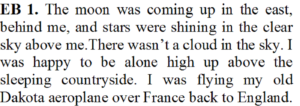

1. Why was narrator flying to England?
2. Which phrase in the extract mean ‘rising’
3. Which word in the extract mean ‘land outside a town or city’?
4. How can you infer that the weather was clear?


1. How far away was the pilot from Paris when he saw clouds?
2. Which word in the extract is synonym of ‘sufficient’?
3. Which plane was being flown by the pilot?
4. Where was the narrator going in the plane?
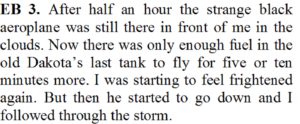

1. Which word in the extract is antonym of ‘familiar’?
2. Why was the pilot feeling frightened again?
3. What did the pilot see when his plane went down further?
4. How many fuel tanks did the Dakota have?
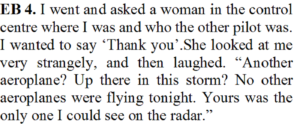

1. Why did the pilot go to the control room?
2. On which equipment can a plane be seen?
3. Which word in the extract is antonym of ‘answered’?
4. What was the colour of another aeroplane?
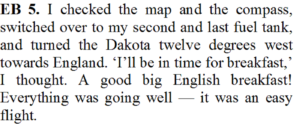

1. Who had instructed narrator to turn twelve degrees north?
2. With whom did the narrator want to have his breakfast?
3. Which phrase in the extract mean ‘changed’?
4. What caused his easy flight into difficulty?
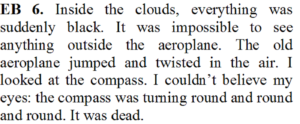

1. Why it was impossible to see anything?
2. How did the aeroplane behave in the clouds?
3. Which word in the extract mean ‘not working’?
4. Which word in the extract is antonym of ‘gradually’?


1. Who is being referred as ‘he’ in the above extract?
2. Which word in the extract is antonym of ‘suddenly’?
3. How many lights did the black plane have?
4. Why pilot of Dakota plane was like an obedient child?
Short Answer Questions (30-40 words)


Answer: The pilot took the risk of flying his plane into the storm clouds.
He wanted to reach his home in England as quickly as possible.
He could have travelled back to land at Paris airport.


Answer: The narrator was not able to see anything. All equipment of his plane had stopped working. The pilot of other plane had signalled to follow his plane. The narrator thought a help is being extended to him so he followed the other plane.


Answer: On the radar of the control room she had not seen any other aeroplane. The old Dakota was the only plane flying that night. But the narrator had asked about the other plane flying. Therefore she was shocked.


Answer: The narrator had lost his way in the storm. All equipment of his plane had stopped working. He safely landed at an airport with the guidance of another plane. Therefore he was happy and made that comment.


Answer: At around one thirty in the morning the narrator had called Paris control room. He had called the control room to get instruction about direction to his destination.
Long Answer questions (120-150 words)


Answer: The writer saw black storm clouds while flying to his home. He was eager to reach his home as quickly as possible. He took the risk and flew his plane into the clouds. His plane started jumping and twisting. He could not see anything. All equipment in his plane stopped working.
He saw a black plane near him. It did not have lights on its wings but he could see it. The pilot of that plane waved at him to follow. The black plane took a turn to north so that it was easier for the narrator to follow.
They flew in the storm for about thirty minutes. After that fuel in his plane was merely sufficient to fly for next five or ten minutes only. The black plane started going down. The narrator also followed. Very soon he could see two rows of lights of a runway and he safely landed.


Answer: The narrator appeared to be a skilled pilot. He could assess the gravity of storm clouds. He had considered the options of flying up or round the clouds and going back to Paris.
However his emotions of reaching his family as quickly as possible over-ruled the reality. He flew directly into the clouds and got into a great difficulty. Fortunately he was able to avoid the risk to his life.
It may appear that he was confident of his skill of flying and that he was courageous. But certainly it was not a wise decision. One must differentiate between being courageous and being suicidal. Emotions need to be controlled and evaluated against reality.
If I were in his position, I would have returned to Paris and travelled to England after passing over of the storm.


Answer: In the beginning of the flight sky was clear. Narrator had taken instructions from Paris Control Tower for his journey to England.
Suddenly he saw huge black clouds ahead of his plane. He did not have enough fuel to go up and fly over them nor to go around them. He considered going back to Paris which was about 150 KM behind him.
However his emotions of reaching to his family overpowered him. He flew straight into the clouds. Soon his plane started jumping and twisting. All instruments of his plane stopped working. He was completely lost.
Suddenly a black plane appeared on his side. Pilot of that plane signaled him to follow it. After about 30 minutes of flying the black plane started going down and he could see two rows of light of a runway. He landed at the airport safely.
****
HOW TO TELL WILD ANIMALS
(Extra Questions)
Extract Based Questions
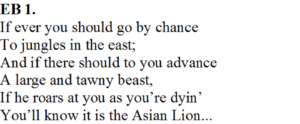

1. What happens when a lion roars?
2. Which word in the extract mean ‘yellow-brownish colour’?
3. Which word in the extract is antonym of ‘retreat’?
4. Which poetic device is used in ‘you should go by chance’?
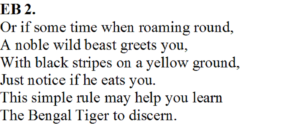

1. How can one recognize a tiger?
2. Which word in the extract mean ‘skin’?
3. Which poetic device is used in ‘when roaming round’?
4. Where are you likely to meet a tiger?
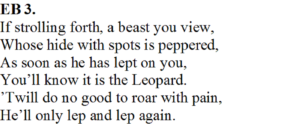

1. How does skin of a leopard appear?
2. Which word in the extract mean ‘walking’?
3. What does a leopard do when it sees its prey?
4. Which poetic device is used in ‘He’ll only lep and lep again’?
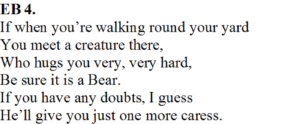

1. What does a bear do when it meets you?
2. Which word in the extract mean ‘loving touch’?
3. Which word in the extract is antonym of ‘certainties’?
4. Which poetic device is used in ‘If when you are walking’?
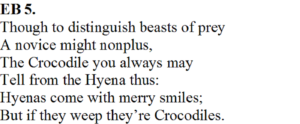

1. What is the characteristic of Hyenas?
2. Which word in the extract is synonym of ‘differentiate’?
3. Which word in the extract is antonym of ‘expert’?
4. Which poetic device is used in ‘But if they weep they’re crocodile’?
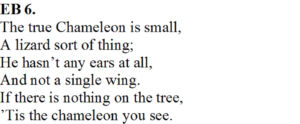

1. What does a chameleon lack?
2. Which word in the extract is antonym of ‘big’?
3. Which phrase in the extract has the synonym of ‘similar’?
4. Which poetic device is used in ‘And not a single wing ’?
Short Answer Questions (30-40 words)


Answer: Asian Lion is a large and tawny beast. Its roar is very loud.
The Bengal tiger has yellow skin with black stripes. It does not roar but attacks silently.


Answer: A hyena laughs when it eats its prey.
A crocodile weeps while eating its prey.


Answer: A leopard has black spots peppered over its body.
As soon as leopard sees a prey it leaps on the prey. It keeps on pouncing on the prey until it kills its prey.


Answer: A bears gives its prey a very tight hug to kill. If the prey is still alive, the bear would give it one more hug to kill.


Answer: When a bear sees its prey it would hug the prey very tightly to kill. If the prey still survives, bear gives it another hug.
A novice may confuse the hug of bear as loving gesture and get confused.
****
THE BALL
(Extra Questions)
Extract Based Questions


1. What has the boy lost?
Answer: The boy has lost a ball.
2. Where has the ball finally gone?
Answer: The ball has finally gone into a water pool
3. Which word in the extract is synonym of ‘happily’
Answer: merrily
4. Which poetic device is used in the last line of the extract?
Answer: Oxymoron. The word ‘merrily is opposite to the emotions of the boy.
5. What did the poet observe?
Answer: Poet saw the ball dancing down the street and finally going into a poll of water.
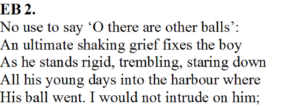

1. Why saying that ‘O there are other balls’ is on no use?
Answer: The boy has emotional attachment with the old ball.
2. What does the boy looking for?
Answer: The boy is looking for his old ball
3. Which word in the extract is synonym of ‘affects’
Answer: fixes
4. Which poetic device is used in the third line of the extract?
Answer: Alliteration. The letter ‘s’ has been repeated.
5. Which harbor has been referred to in above extract?
Answer: The pool of water has been referred as harbor.
6. Which word in the extract mean ‘to disturb’?
Answer: Intrude
7. Why poet does not want to ‘intrude on him’?
Answer: The boy is busy trying to tolerate the loss of his ball. Hence poet does not want to disturb his thoughts.
8. What is the condition of boy?
Answer: The boy is sad. He is trembling and looking in the direction his ball has disappeared.
9. Who is referred as ‘I’ in above extract?
Answer: The poet


1. What is the meaning of dime?
Answer: Dime means a very small amount of money.
2. What type of world is indicated in the poem?
Answer: It is world of possession or a materialistic world.
3. What makes the boy sense his first responsibility?
Answer: Loss of ball makes the boy realize his first responsibility.
4. Which poetic device is used in the last line of the extract?
Answer: Repetition. The word ‘ball’ has been repeated.
5. What is the meaning of ‘balls will be lost always’?
Answer: In this world there will always be loss of materialistic things.
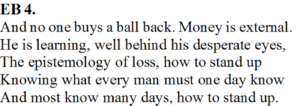

1. What can buy the ball back?
Answer: Nothing can buy back the lost ball.
2. What is learning for the boy?
Answer: One would lose things one loves. This is a big learning.
3. Which word in the extract mean ‘reality’?
Answer: Epistemology
4. Which phrase in the extract mean ‘to tolerate’?
Answer: stand up
5. Which poetic device is used in ‘And no one buys a ball back.’?
Answer: Alliteration. The word ‘b’ has been repeated.
6. Who is author of the poem from ehich the above extract has been taken?
Answer: John Barryman
7. What is the lesson poet wants to give through this extract?
Answer: There will always be losses in the life. We must know how to face these losses.
8. Who is referred as ‘he’ in the above extract?
Answer: The boy who has lost his ball
Short Answer Questions (30-40 words)


Answer: He had emotional attachment with his old ball. He had been playing with it since his childhood. He had realized that he will never be able to get his old ball.
Hence he was sad.


Answer: After losing the ball the boy relaises that he would never be able to get back his ball. This is a lesson for him to be responsible for taking care of his things.
The loss makes him understand how to stand up to the losses in life. This way also he learns the lesson of responsibility.


Answer: The boy was trying to understand the grief caused by loss of things dear to him. He was also trying to stand up to the loss of his belongings. Thus he was learning a life lesson.
Hence poet did not disturb the boy.


Answer: The poem narrates that he was very sad to lose the ball.. The ball had been with him since childhood. The poem also states that the boy was trying to learn his first responsibility.
Thus we infer that it was his first loss.


Answer: Poet observed a boy standing in the street who did not how to respond to the loss of his ball. The poet had seen the ball bouncing in the street and merrily going into a pool of water.


Answer: Poet want to say that nothing can compensate the permanent loss of anything. Money is simply a medium to buy things. Even money cannot buy everything.
Thus money alone cannot give happiness. Therefore it is an external factor.


Answer: The boy lost the ball while he kept watching the ball going into a water body. He felt helplessness. He was terribly shaken and full of grief. He could not move though trembling. He continued to look at the ball as it submerged in water.
Long Answer Questions ( 120-150 words)


Answer: The poet starts the poem by narrating how a boy is helpless while he loses his old ball. The ball bounces in the street and plunges into water. Poet wants to say that we may lose many things right in front of us and we may not be able to do anything about it.
The permanent loss cause deep sorrow and emotional setback. Many times one may not be able control one’s emotions.
But the life is like that only. Every person would lose something or the other during one’s life time. We need to learn to bear such losses. We need to stand tall and strong in every circumstances.
Money cannot buy everything in the world. It is an external factor to happiness and satisfaction.
Sooner we understand this truth of life better it is for us. This is the theme of the poem.
****


0 Comments